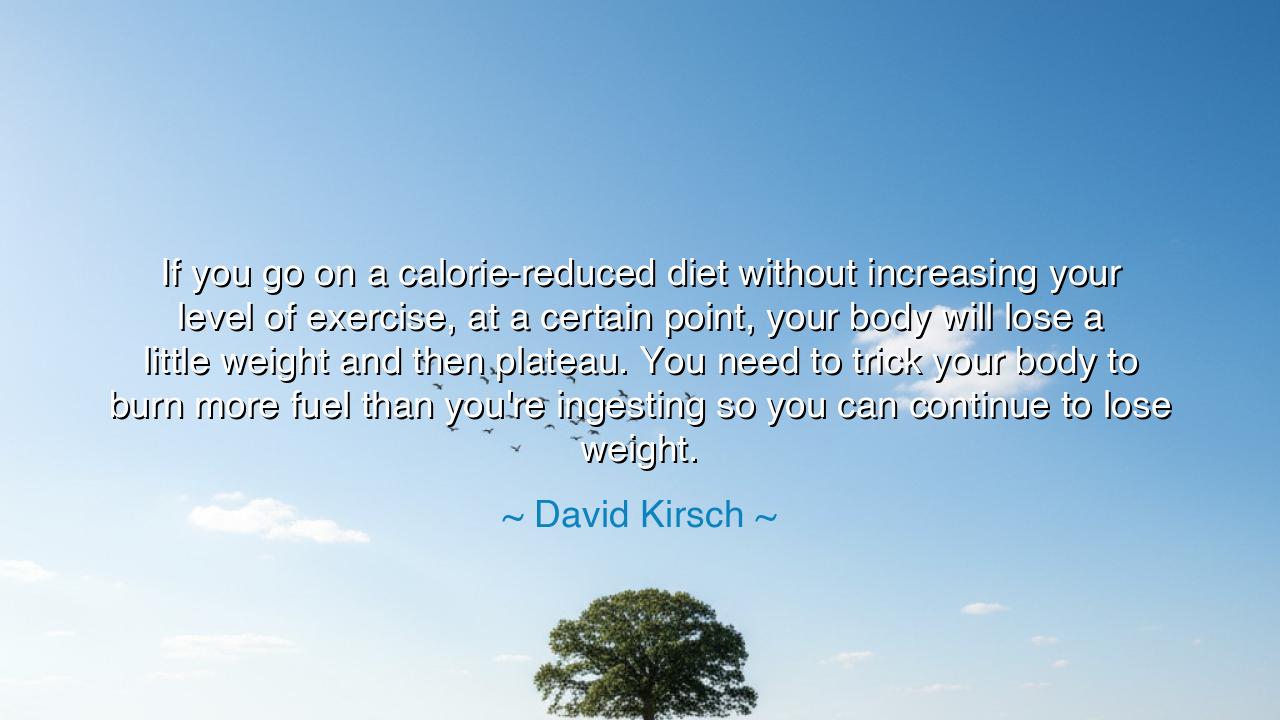
If you go on a calorie-reduced diet without increasing your level
If you go on a calorie-reduced diet without increasing your level of exercise, at a certain point, your body will lose a little weight and then plateau. You need to trick your body to burn more fuel than you're ingesting so you can continue to lose weight.






Hear now, O seekers of wisdom, the words of David Kirsch, a modern guide who speaks of the eternal struggle between nourishment and discipline: "If you go on a calorie-reduced diet without increasing your level of exercise, at a certain point, your body will lose a little weight and then plateau. You need to trick your body to burn more fuel than you're ingesting so you can continue to lose weight." These words, though spoken in the context of modern health, carry within them the essence of an ancient truth—the body is a temple that requires not just restraint, but balance and effort to remain in a state of vitality and strength.
In the ancient world, Hippocrates, the great physician, understood that the body, like any vessel, must be tended to with both wisdom and discipline. He believed that health was not simply about reducing intake, but about cultivating strength through exercise and balance. The notion that one could lose weight by simply depriving the body of nourishment was foreign to the ancients, for they understood that true health comes from the union of nourishment, effort, and balance. David Kirsch echoes this in his words, suggesting that to achieve sustained weight loss, one must engage the body in active effort—to push it beyond the plateau, to trick it into using more fuel than it takes in. This requires not only diet but the relentless pursuit of physical strength through exercise.
Reflect upon the mighty Spartans, warriors renowned not just for their courage but for their discipline. The Spartans knew that battle was not won by mere strength of arms, but by the strength of the body, which had been forged through rigorous training and endurance. Their diet was not one of excess, but of careful nourishment. However, it was their commitment to exercise—to the relentless pursuit of physical fitness—that truly set them apart. They understood that weight and strength are not gained through the mere act of dieting, but through the combination of nourishment and consistent effort. The Spartans, though men of war, were also men of discipline, understanding that true power lies in the balance between food and exercise, between rest and effort.
Consider also the great Alexander the Great, whose military campaigns were legendary not only for their strategy but for the physical endurance of his soldiers. Alexander’s troops, though hardened by years of battle, were constantly pushed to exceed their limits, forced to march vast distances and endure harsh conditions. Their bodies, though lean and weathered by time, were able to continue because of the consistent balance between their diet and the effort they put forth in training. Alexander himself understood the principle that Kirsch speaks of—when the body reaches a plateau, it must be pushed beyond its limits through sustained effort, whether in the form of exercise or increased physical challenge.
In our modern world, we often fall into the trap of believing that weight loss is a matter of simply cutting back. Many seek to reduce their caloric intake, believing that this alone will bring results. Yet, as Kirsch teaches, this path leads to a plateau, where the body becomes accustomed to the deprivation, and further loss becomes difficult. The ancient philosophers knew that true progress comes from engaging both mind and body. The diet must be paired with exercise, for it is through movement, through effort, that the body is stimulated to change. The body is a living force, and like any force, it must be constantly engaged to remain in motion.
David Kirsch calls us to understand this delicate balance. Just as the ancients understood that nourishment alone is insufficient for true vitality, so too must we recognize that exercise and physical effort are essential to transforming the body. It is not enough to simply reduce what we consume; we must challenge ourselves, push our limits, and coax the body into using more than it takes in. This is the ancient wisdom of balance, where the body is both fed and challenged, where effort and nourishment work in harmony to create strength and endurance.
Let us take these teachings into our own lives, O future generations. When you seek to shape your body, whether for health, strength, or vitality, remember that it is not enough to simply reduce your caloric intake or restrict yourself. You must engage the body in effort, in movement, in training. Push beyond the plateau, trick the body into using more fuel than it consumes, and in this way, you will continue to grow stronger, leaner, and healthier. The path to vitality is not found in deprivation alone, but in the marriage of nourishment and effort—a balance that must be maintained throughout life. Embrace both the discipline of diet and the power of exercise, and in doing so, you will achieve not just weight loss, but a body that is strong, resilient, and full of life.






AAdministratorAdministrator
Welcome, honored guests. Please leave a comment, we will respond soon